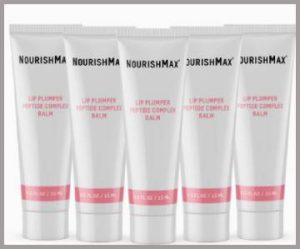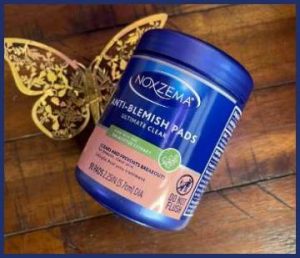If you’ve ever struggled with stubborn dirt, grime, or mildew on your patio, driveway, or car, you know how frustrating it can be to clean with just a regular garden hose. That’s where the Turbo Jet Pressure Washer comes in.
It promises to transform your standard hose into a powerful jet stream for deep cleaning without the hassle of bulky, expensive power washers. But does it actually deliver? After testing it out, I’ve got some strong opinions. If you’re considering adding this tool to your cleaning arsenal, keep reading to see if it’s the right fit for you.
What Is the Turbo Jet Pressure Washer?
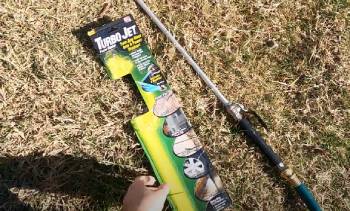
The Turbo Jet Pressure Washer is a high-powered nozzle attachment that transforms an ordinary garden hose into a forceful cleaning tool. Unlike electric or gas-powered pressure washers, it doesn’t require a motor or pump—its built-in pressure chamber amplifies your existing water flow into a concentrated jet stream. This makes it a cost-effective and convenient option for tackling outdoor cleaning jobs without the hassle of bulky equipment.
Made from durable aluminum with stainless steel and brass fittings, the Turbo Jet is built to last. It comes with two nozzles: a Jet-Stream Nozzle for intense, targeted cleaning and a Fan-Spray Nozzle for covering larger surfaces. Whether you need to blast away dirt from sidewalks, clean second-story windows, or rinse off your car, this attachment offers impressive versatility.
One of the standout features of the Turbo Jet is its ability to clean efficiently using only water pressure—no electricity, gas, or special detergents required. While it won’t match the PSI of an industrial pressure washer, it provides more power than a standard garden hose alone, making it a practical choice for everyday cleaning tasks.
It’s easy to use, too. Just attach it to your garden hose, adjust the spray type, and you’re ready to go. Since it’s lightweight and compact, storing it is hassle-free. If you’re looking for an affordable way to boost your cleaning power without investing in a full-size pressure washer, the Turbo Jet Pressure Washer is a smart and effective solution.
My Experience with the Turbo Jet Pressure Washer
When I first got my hands on the Turbo Jet Pressure Washer, I wasn’t sure what to expect. I knew it wasn’t a full-powered pressure washer, but I was hoping it would give my garden hose a serious boost. After attaching it to my hose and testing both the Jet-Stream and Fan-Spray nozzles, I was pleasantly surprised.
The Jet-Stream Nozzle delivered a strong, concentrated blast that easily cleared dirt and grime from my driveway and patio. It even reached the second-floor windows without requiring a ladder. The Fan-Spray Nozzle, on the other hand, was great for rinsing my car and washing down my deck.
One of the biggest advantages was its ease of use. Unlike bulky gas or electric pressure washers, there were no cords, motors, or complicated setups—just attach and spray. I especially liked how lightweight it was, making it easy to maneuver without straining my wrist. It also saved me a trip to the car wash since I could clean my Jeep at home.
That said, the Turbo Jet does depend on your home’s water pressure. If you have lower pressure, you might not get the same powerful effect. But for me, it worked well for general cleaning tasks. It’s not a substitute for a heavy-duty pressure washer, but as a budget-friendly alternative, it gets the job done. I’d recommend it for anyone looking for an easy way to enhance their garden hose’s cleaning power.
How to Get the Most Out of Your Turbo Jet Pressure Washer?
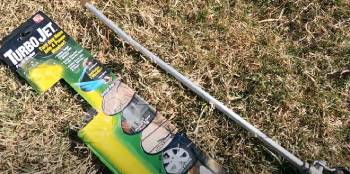
To get the most out of your Turbo Jet Pressure Washer, start by ensuring you have good water pressure. Since this tool relies on your home’s water supply rather than an electric or gas-powered motor, weak pressure can limit its effectiveness. If your water pressure is low, try using a shorter hose or checking for kinks that may restrict flow.
Next, choose the right nozzle for the job. The Jet-Stream Nozzle is best for blasting tough grime, cleaning gutters, and removing debris from driveways. The Fan-Spray Nozzle is more effective for covering larger surfaces like patios, fences, and siding. Switching between the two can make cleaning faster and more efficient.
For stubborn dirt, let the water soak the surface for a minute before spraying. If you’re dealing with mold or mildew, applying a mild detergent beforehand can help break down buildup. Just be sure to rinse thoroughly to avoid residue.
Angle your spray properly to maximize cleaning power. Aiming straight at a surface can cause splashing, while a slight downward angle directs the force where it’s needed most. For delicate areas like painted surfaces or garden beds, keep a safe distance to prevent damage.
Finally, maintain your Turbo Jet by rinsing it after each use to prevent clogs. Check for any leaks or loose fittings, and tighten them as needed. With proper use and care, your Turbo Jet Pressure Washer will remain a reliable tool for keeping your outdoor spaces spotless.
Pros and Cons of the Turbo Jet Pressure Washer
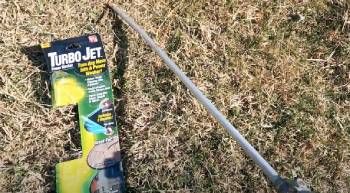
Pros:
- Easy to use: No need for electricity or gas—just attach it to your garden hose.
- Affordable: Much cheaper than a traditional pressure washer.
- Durable build: Made with high-quality metal components.
- Lightweight and portable: Unlike heavy power washers, this is easy to handle.
- Versatile: Can be used on decks, patios, cars, windows, and more.
Cons:
- Limited by water pressure: If your home has low water pressure, performance will suffer.
- Not as powerful as a real pressure washer: It can’t handle extremely tough stains.
- May leak if not tightened properly: Some users report leaks at the nozzle connection.
- Not ideal for heavy-duty cleaning: It’s more suited for light to moderate jobs.
Also Read: My Thoughts On Hatana Hot Tubs
Turbo Jet Pressure Washer Vs. Other Options
- Turbo Jet Pressure Washer Vs. Standard Hose Nozzle
A standard hose nozzle controls water flow but doesn’t increase pressure. It’s fine for watering plants or light rinsing, but when it comes to blasting away dirt, it falls short. The Turbo Jet Pressure Washer, with its internal pressure chamber, delivers a much stronger stream for tackling grime, mildew, and debris. If you need serious cleaning power without upgrading to an electric pressure washer, Turbo Jet is a step up from a basic nozzle. However, if your water pressure is low, you may not see a dramatic difference. For everyday outdoor cleaning, Turbo Jet provides more force and versatility.
- Turbo Jet Pressure Washer Vs. Electric Pressure Washer
Electric pressure washers generate significantly higher PSI, making them ideal for deep cleaning patios, driveways, and siding. However, they require an electrical outlet, take up more space, and often involve setup time. The Turbo Jet, in contrast, is lightweight, portable, and attaches directly to your garden hose with no extra power source needed. It’s perfect for those who need an easy-to-use, budget-friendly alternative for light to moderate cleaning. If you frequently clean tough stains, an electric pressure washer is the better investment, but for quick jobs, Turbo Jet is far more convenient.
- Turbo Jet Pressure Washer Vs. Gas-Powered Pressure Washer
Gas-powered pressure washers are the ultimate heavy-duty cleaning machines, reaching PSI levels capable of stripping paint, removing oil stains, and blasting away deep grime. However, they’re expensive, loud, and require fuel and maintenance. Turbo Jet is the practical choice for homeowners who don’t need extreme power but still want an efficient way to clean decks, fences, and patios. While it can’t compete with gas pressure washers in sheer force, it’s a far more affordable and user-friendly option for routine outdoor cleaning without the bulk and upkeep.
- Turbo Jet Pressure Washer Vs. Expandable Hose with Spray Nozzle
Expandable hoses are great for flexibility and easy storage, but their built-in spray nozzles don’t increase pressure. They’re designed more for convenience than power. Turbo Jet, on the other hand, focuses on boosting water force to remove dirt and grime effectively. If you’re mainly looking for a space-saving hose to water plants or rinse surfaces, an expandable hose works well. But if you need a stronger stream for cleaning patios, driveways, and gutters, Turbo Jet is the better option. For those who want both convenience and pressure, pairing an expandable hose with the Turbo Jet is a smart move.
- Turbo Jet Pressure Washer Vs. Foam Cannon for Cars
A foam cannon is designed to cover vehicles in thick, soapy foam for deep cleaning, while the Turbo Jet is meant for high-pressure rinsing. If you’re serious about detailing your car, a foam cannon works best when paired with a pressure washer. Turbo Jet can help with rinsing, but it won’t provide the same thick lather or deep clean that foam cannons offer. If you’re looking for a simple way to rinse dirt off your car without investing in a full pressure washer setup, Turbo Jet is a good alternative, but it’s not a substitute for a proper foam cannon.
Also Read: My Thoughts On Westinghouse Vs. Ryobi Pressure Washers
Frequently Asked Questions (FAQs)
Several brands are known for their reliability, including Sun Joe, Karcher, Ryobi, and Simpson. The best choice depends on your needs, with electric models offering convenience and gas models delivering high power.
PowerJet pressure washers are similar in function to the Turbo Jet but vary in quality. Some users find them effective for light cleaning, while others report durability issues. The effectiveness largely depends on water pressure.
A turbo nozzle increases cleaning power by spinning a narrow water stream at high speed. This creates a more concentrated and forceful spray, making it easier to remove tough grime and stains.
For most household tasks, a pressure washer with 1500 to 3000 PSI is sufficient. Lighter jobs like washing cars need around 1500 PSI, while tougher jobs like cleaning driveways require closer to 3000 PSI. Turbo Jet operates based on your home’s water pressure, so it doesn’t reach these PSI levels but still enhances cleaning efficiency
Final Thoughts
If you need an affordable, easy-to-use tool for light to moderate outdoor cleaning, the Turbo Jet Pressure Washer is worth considering. It’s especially useful for tasks like clearing gutters, washing windows, and removing loose debris from patios and driveways. However, if you’re expecting the power of a gas or electric pressure washer, you might be disappointed.
For those who already have decent water pressure at home, this tool can be a handy addition to your cleaning routine. If your water pressure is weak, you may not get the performance you’re hoping for. In the end, it’s all about managing expectations. For $20, it’s a convenient solution that can save you time and effort on smaller cleaning jobs.

